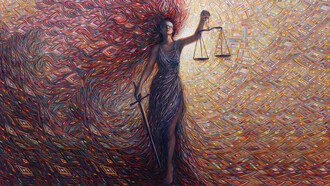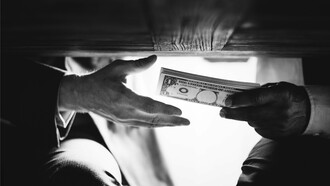Socio-economic and political unrests
African countries are facing multi-dimensional human security issues, and not only COVID-19. These issues include conflict, poverty, and hunger. South Africa's socio-economic problems increased with the arrival of coronavirus disease. Stats SA (2021) records that the unemployment rate of South Africa in the first quarter of 2021 was 32.6% because of job losses caused by lockdown measures. Unemployment often fuels protests because of the frustrations and pressure of poverty.
Vhumbunu (2021) argues that after the judiciary order for former President Jacob Zuma's arrest, violent protests emerged, starting in KwaZulu-Natal, and moving to Gauteng provinces. At first, the current South African President, Cyril Ramaphosa, referred to the riots as an attempt to overthrow the government. However, he later implied that the intermitted looting was influenced by severe inequality, poverty, and unemployment.
The riots and looting began after Jacob's Zuma arrest on the 07th of July 2021 and lasted until the 17th of July 2021. In this period, about 337 died. The police arrested more than 2000 people for theft, vandalism and looting. However, the protest could not be controlled, and the pervasive looting of stores led to the deployment of the South African National Defence Force, amounting to 2500 staff and later raised to 25000. Davids (2021) asserts that socio-economic aggravation was the driving force behind the riots.
According to Stats SA (2021), the 2021 youth unemployment rate was 64%, and South Africa ranks among the unequal countries concerning income inequality and health distribution. World Bank (2020:1) records that over 30.3 million people live in poverty, accounting for approximately 55.5% of the population. Furthermore, the economic challenges experienced by South Africa because of lockdown measures caused GDP shrinkage of 7% in 2020, and the continuous down growth of the economy will increase the levels of unemployment, causing people to join protests and creating a security crisis.
In this note of instability and increasing levels of unemployment, many insured businesses are under the South African Special Risks Insurance Association, a state-owned insurance company, but not all companies are covered. Large companies that suffer extensive damages exceeding insurance cover need to pay from their savings, and small businesses without insurance have limited cover. The riots led to mass job losses, as some looted companies had to close down, especially those in townships.
The protests severely impacted the South African economy, with more than 20 warehouses destroyed, over $1 billion in damages and 130 000 job losses (Wilson and Cele, 2021). Kendall (2020) argues that small local businesses suffered the most during the looting. Most local businesses are small start-up companies without insurance, especially in townships. The arrest of Jacob Zuma was just a build-up to the frustrations amongst the South African population due to high corruption and unemployment.
The severity of the protests – socio-economic and political factors
While the South African government pushed for rapid COVID-19 vaccination roll-out, the riots in 2021 halted the vaccine programs; this was a severe setback because the South African Department of Health stated that over 25 000 vaccines were looted and destroyed and prevented the target of 300 000 population per day. The initial plan to vaccinate 67% of the population by the end of 2021 failed to materialise to achieve herd immunity. About 90 pharmacies in formal and informal human settlements were closed in KwaZulu-Natal and Gauteng, which mainly affected people with chronic diseases. (Vhumbunu, 2021)
The community of Phoenix in Durban felt security uncertainty because of looting, vandalism and riot activities. Security uncertainty led to the death of 36 people, and allegations of racial tensions increased. Most business owners became armed and joined the community policing forums. The July 2021 riots led to 3400 arrests for inciting public violence and looting in Gauteng and KwaZulu-Natal. The Tongaat Hulett settlement sugarcane in KwaZulu-Natal was burnt. These riots had economic implications, as sugarcane transport tracks were looted; coal mining in KwaZulu-Natal was halted because of workers' absence due to protests. Montclair Mall in Durban stated that it would cost between ZAR30 million and ZAR50 million for repairs. This is an economic backdrop because the country focuses on repairing instead of investment and job creation.
The ongoing socio-economic crisis and xenophobia?
According to Big-Alabo (2020) and Marindze (2010), African nations have criticised South Africa concerning xenophobic acts. Foreign nationals remain at risk every time there are protests, and the rising unemployment rate due to COVID-19 makes foreigners vulnerable to attacks. The ZAR350 COVID-19 Grant implemented by the government does not significantly impact as it is below the poverty line.
Amnesty (2021) indicated that by September 2021, there were reports of foreign-owned spaza shops (informal businesses) being looted in Thokoza, Johannesburg. The looters blamed foreigners for taking over the local businesses and pushing South African citizens out of economic participation in township businesses. There has been a continuous attack on foreign-owned businesses across the country, and rising unemployment levels have influenced the attacks.
The #PutSouthAfricaFirst campaign is taking centre stage and has emerged strongly due to the pandemic, as people have lost jobs. This campaign targets foreign nations by stating that they are taking jobs made for South Africans and are depleting public health resources. In addition, COVID-19 exacerbates the socio-economic issues that the government's lockdown measures are causing. These measures have caused a widespread recession.
Lalbahadur (2020) believes that the "South Africans first" slogan is becoming famous among politicians, putting foreign nationals in the spotlight and seeing them as 'job takers'. On the other hand, Cohen and Naidoo (2020) assert that former Finance Minister Tito Mboweni stated in April 2021 during his address that people who approach banks must demonstrate that they have a labour policy; favouring South African citizens. In addition, the new policies of the Department of Employment and Labour will limit the number of foreign nations in restaurants, agriculture, tourism and hospitality.
Although the introduction of foreign restriction policies is an excellent initiative in protecting the economic participation of South Africans, it can potentially cause a socio-economic crisis in the countries of origin. For example, some African foreigners came to South Africa seeking a better standard of living, and pushing them back to their mother countries might cause spill-over effects in South Africa. For instance, some come from conflict-stricken countries, and worsening economic situations can cause people to join terrorist acts.
The relief packages implemented by the South African government excluded foreigners. COVID-19 Grant of ZAR350 ($20) was not distributed to refugees and asylum seekers due to barring from eligibility. This matter was taken to court by human rights advocates. Pretoria High Court delivered a judgement on the 18th of June 2020 by declaring the debarment of refugees and asylum seekers from the ZAR350 ($20) grant unconstitutional, and the state was compelled to change the policy (Lalbahadur, 2020).
Securitising a threat
Following lockdown measures across the African continent, there has been a 30% increase in government repression and aggression towards civilians (ACLED, 2020). South Africa was one of the countries recorded to have used state oppression against the public. Neat and Desmidt (2021) argue that the Uganda police charged 23 civilians living in a house for the LGBTI community by accusing them of disrespecting COVID-19 regulations. Framing COVID-19 as a security threat gave governments an upper hand in using excessive force.
The South African government deployed the South African National Defence Force to implement COVID-19 regulations across the country, and many people were abused as videos surfaced across social media. Likewise, in the Nigerian case, regulations enforced by security caused deaths. Securitisation of COVID-19 has proved to be a pillar for government to use force excusably. PMG (2020) notes that the Joint Committee on Defence in South Africa reported vicious behaviour from the South African National Defence Force towards the public at the beginning of the lockdown. However, the Minister of South African Defence argued that they should avoid diverting from the military's valuable operations in curbing the spread of COVID-19.
Rolland (2021) illustrates that the extraordinary regulations instigated by states are acceptable to some extent when an issue has been framed as a security threat. Again, the World Health Organisation made it easy for worldwide governments to convince their “audience”, in this case, the ‘public’ that COVID-19 is an international security threat, and the states were able to implement movement restrictions, gathering bans, curfew introductions, quarantine regulations and lockdown methods.
What needs to be done?
COVID-19 measures caused economic instability to some extent. The riots caused economic disruption, worsening unemployment and the poverty rate. Negative socio-economic factors increase the likelihood of looting and riots in the future and make the economy more vulnerable. The restrictions negatively impacted the economy, and it is not all informal businesses with savings. Some used business capital for survival resulting in temporary or permanent shutdowns (Mokhaloane, 2020).
- Social security remains essential as it can be used to reduce poverty. Financial support for poor people is necessary to mediate the damaging socio-economic crisis. In addition, through social security, the government can reduce the high level of protests caused by economic distress.
- The South African government needs to reintroduce the concept of the Ubuntu (Humanity, kindness) approach to the public. This will help to reduce the high levels of xenophobic attacks.
- The President of South Africa should address the high corruption levels effectively, not only in theory. This is because the mismanaged money can be redirected to job creation and to address other socioeconomic issues.
References
Amnesty International. 2021. South Africa 2020.
Big-Alabo, S and Big-Alobo T. 2020. Xenophobic attacks on Nigerians in South Africa: Ethical implications, and responses of the Nigerian government; ResearchGate.
Davids, D. 2021. Counting the costs: Drivers and implications of South Africa’s recent unrest.
Kendall, J. 2021. South Africa political unrests in a vulnerable economy.
Lalbahadur, A. 2020. COVID-19 impact on South Africa's relations with Africa. South African Institute of International Affairs.
Mokhaloane, S.M. 2021. Socio-political dilemmas faced by Uganda and South Africa in the third wave: The impact of lockdown measures.
Ozili, P.K. 2020. COVID-19 in Africa: Socio-economic impact, policy response and opportunities.
Parliamentary Monitoring Group. 2020. COVID-19 SANDF deployment with Deputy Minister.
Rolland, A. 2020. The securitization of COVID-19: Implications for civilian privacy.
Vhumbunu, C.H. 2021. The July 2021 Protests and socio-political unrest in South Africa.
Wilson, L. & Cele, S. 2021. South Africa economy set to take $3.4 billion hit from riots.
World Bank. 2020. South Africa COVID-19 response development policy operation.















